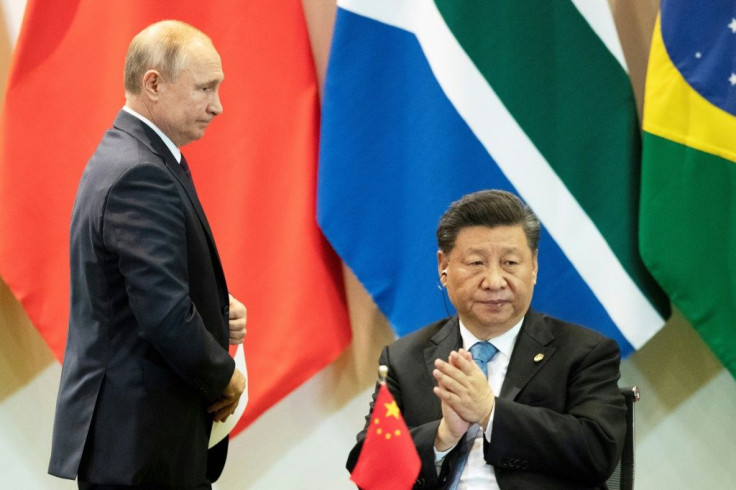BRICS Provides Breather For Putin To Push For De-dollarization Of Trade

Despite their mismatched ideologies, the BRICS virtual summit, hosted by China for Russia, India, Brazil, and South Africa, proved beyond doubt that the U.S. and the EU have only partially succeeded in ostracizing Moscow, opening a new lease of life for the sanctions-hit Russian economy.
In a stark reminder of the limits of U.S.-led sanctions and efforts to isolate Russia, the 14th BRICS summit put Russian President Vladimir Putin in the limelight on a high-profile international stage, four months after the invasion of Ukraine.
He used the gathering to denounce the U.S.-led economic sanctions and called for unity between developing economies, which was also echoed by China and India - the world's second and sixth largest economies, respectively.
At the opening of the two-day summit, Xi set the tone for the virtual summit on June 23 by decrying the sanctions, and said they are double-edged swords that would "bring harm to the people of the world."
In his own video address, Putin called the sanctions politically motivated which were "contrary to common sense and basic economic logic."
In his new avatar, Putin proved practical and said Russia was redirecting its trade to BRICS nations and other reliable partners. A total of 35 nations abstained from the UN vote condemning Russian aggression against Ukraine on March 2 whom Russia considers as its reliable partners.
Of the five BRICS nations, Brazil, however, supported the resolution. But Brazil has repeatedly snubbed U.S. entreaties and has said that it was in solidarity with Russia.
After being thrown out of SWIFT, the international payment settlement system among banks, by the West, Russia has been struggling to conduct trade in international currencies.
But Putin used the summit to settle trade in own currencies of BRICS nations -- outside the US dollar system. With India, Putin has already held advanced-level talks to piece together a ruble-rupee payment mechanism.
Putin told the virtual gathering that BRICS partners were "developing reliable alternative mechanisms for international settlements" and "exploring the possibility of creating an international reserve currency based on the basket of BRICS currencies."
De-dollarization of trade has been one of the planks of Putin to stave off Russia's pariah status. The BRICS nations' plan to press ahead with the de-dollarization of trade departs from that of the declared U.S. and EU policy of isolating Russia from global trade.
Since its inception in 2009, the BRICS has remained a paper tiger with leaders occasionally doing lip service though the economy has always been the focal point of the five-nation grouping.
Its core purpose of reshaping the global economy and creating a new financial order has largely remained on paper. They wanted reforms at the International Monetary Fund and the World Bank, but did nothing to achieve them.
Despite the BRICS' moderate success, its importance cannot be skipped as it combines a population of 3.23 billion and in 2021 the five nations posted a GDP of more than $23 trillion -- more than the U.S. ($ 20,9 trillion) and the EU($17,9 trillion).
Indian PM Narendra Modi, South African President Cyril Ramaphosa and Brazilian President Jair Bolsonaro along with Putin and Xi talked about giving more relevance to the grouping at a time when the global economy is battered by West-led sanctions against Russia.
Inflation is running amok in many countries, including EU nations, with soaring food prices and civil unrest. The global supply chain is disrupted because of the Russian blockade of the Black Sea and fears of food shortages are running high in Asia and Africa.
Perhaps Modi gave a hint at what is in store for BRICS in the coming days. The Indian prime minister has mooted the idea of the New Development Bank, a satellite agreement, a Covid research center in South Africa, and mutual recognition of pharmaceutical products, including Covid-19 vaccines, within BRICS nations.
Xi has put forth a four-point action plan for the BRICS to be spearheaded among the emerging markets and developing countries that are attending the BRICS two-day summit on June 24.
Xi's suggestions include strengthening multilateral organizations, collaboration on the post-pandemic response, keeping supply chains secure, and more investment in poverty alleviation, health and food security.
"Such practical steps make BRICS a unique international organisation whose focus is not just limited to dialogue," Modi added.
Suggestions by Modi and XI and the decision to reach out to more nations in Africa and Asia show that the grouping is not limited to dialogue anymore.
This is more than what Putin and Russia's battered economy like to hear. Now, Putin can build Russia brick by brick as the ancient Romans did.
























